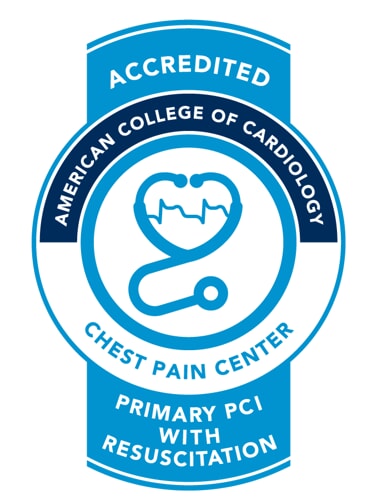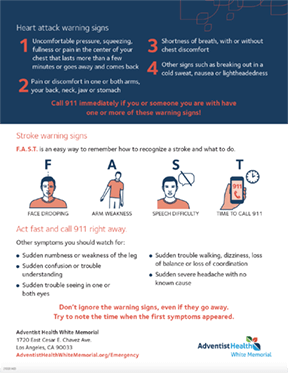Heart Health
Cardiology and Interventional Cardiology

It is never too late to make changes to reduce the risk of having a heart attack. Amazingly enough, when people who have smoked for decades quit smoking, within two years their risk of having a heart attack falls within two years to that of someone who has never smoked.
Preventing heart disease is possible, and the experts at Adventist Health Simi Valley can help.
For more information or to make an appointment, call(805) 955-6560.
- American Heart Association Gold Plus Quality Achievement Award and Target Stroke Elite Plus Honor Roll
- American Heart Association STEMI Receiving Center Quality Achievement Award
- Accredited Chest Pain Center with Primary PCI and Resuscitation

We will partner with you to recognize your symptoms and address risk factors early. Our cardiologists offer an integrated approach to patient care, including:
- Comprehensive assessment of all cardiovascular risk factors
- An individualized nutrition plan
- Lifestyle counseling

Heart and Stroke Signs and Symptoms Guide (English)
Heart and Stroke Signs and Symptoms Guide (Spanish)
We provide full Cardio Services, Cardiology Consultations, and following procedures in office:
- Cardio Consultation
- Stress Echo
- Echocardiogram
- Carotid Ultrasound
- 24hr Holter Monitor
- EKG
- Pacemaker Checks
- Blood Pressure Check
- Treadmill test
- Zio Patch - 7 Days of Monitoring
- Cardio Net - Up to 30 Days of Monitoring
- Blood Draws
FAQ'S About Preventing Heart Disease
When Should I Start Paying Attention to My Heart Health?
- It is never too early to start! Whether or not you develop heart disease will depend on your behaviors and environment, genetic factors, or a combination of both.
- Coronary artery disease, the most common form of heart disease, typically begins in early adulthood. Some people are born with inherited heart or metabolic problems that raise their risk for the early appearance of heart health issues. Knowing something about your family's health history is a good start.
- Get screened regularly to find out if you have high LDL (low density lipoprotein) cholesterol, high blood pressure or high blood sugar—conditions that are relatively symptomless but that raise your risk for coronary artery disease.
How Can I Avoid Heart Disease?
- Eating heart-healthy food
- Being physically active
- Not smoking
- Maintaining an appropriate weight
Control of risk factors with lifestyle change, and sometimes with medications like statins, can reduce the risk of heart attacks.
For some people with specific genetic conditions, like familial hypercholesterolemia and hypertrophic cardiomyopathy, the effect of their genes tends to dominate the effect of environment, although environment continues to play a role.
For people without such a strong genetic component, a family history of heart disease may still provide clues. Some drugs, including cocaine and methamphetamines, and medical treatments, such as chemotherapy, can also damage the heart.
Other medical conditions, like diabetes and sleep apnea, can also raise your risk for heart disease, so finding good care for those conditions is also important. As you grow older, it also makes sense to know the symptoms of a heart attack, so you can seek prompt medical attention if they occur.
